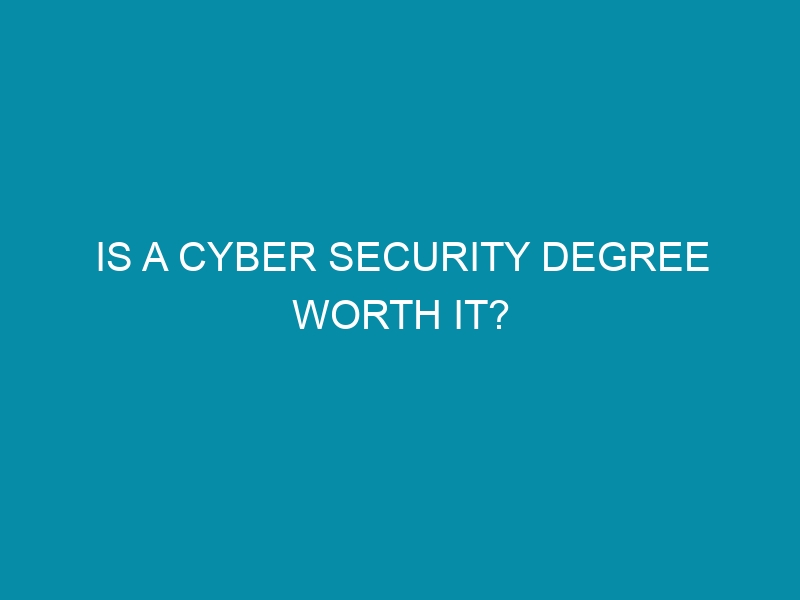Is a Cyber Security Degree Worth It?- It’s no secret that data security is becoming increasingly important. It seems like there isn’t a week that goes by without a new news about the latest data leak or cybersecurity blunder. In recent years, major corporations such as Marriott International®, Equifax®, and Yahoo® have all been hacked.
Businesses and organisations that play vital roles in practically every part of our lives are affected by the constant assault of cyber threats. Many Americans are becoming increasingly anxious as a result of this. Those fears are well-founded, as an FBI research estimates that cybercrime cost the economy $3.5 billion in total damages in 2019—and that’s just what’s known.
As our reliance on technology rises, it’s no wonder that the need for cybersecurity professionals expands as well.
What Role can you Play in the Fight Against Cybercrime?
You’ve heard the figures and seen the headlines, which is why you’re thinking about pursuing a cybersecurity profession based on your passion for technology. You’re eager to join the fight against cybercrime, but you’re not sure where to start.
One question jumps out in particular: Is a Cyber Security degree worthwhile? That is a question we are unable to answer for you. However, we can give you with crucial information that will assist you in making the best option for your future.
8 Facts to Consider About the Value of a Cyber Security Degree
You’ve probably heard about how beneficial higher education can be. But let’s skip the fluff and get right to the numbers. Consider the following information before choosing whether a Cyber Security degree is right for you.
Cybersecurity Jobs are on the Rise
If you’re thinking of returning to school to pursue a new career, you’ll want to know that there will be jobs available in the field once you graduate. Because, no matter how enthusiastic you are about the field, you don’t want to waste your time and money on a degree that will lead nowhere.
Fortunately, in the case of cybersecurity, this isn’t an issue. In fact, it’s the polar opposite. Cybersecurity analyst jobs are expected to grow by 31% through 2029, according to the US Bureau of Labor Statistics (BLS), which is more than seven times the average projected employment growth for all occupations. Furthermore, the BLS predicts that employment for these professions will increase by 56 percent over the same time period, particularly in the sector of computer systems design and related services.
Cybersecurity Professionals are Needed in all Industries
The above-mentioned expansion isn’t restricted to the IT sector. In today’s digital world, information security services are required by practically every firm in every industry. When it comes to finding a career, this implies you won’t be limited to certain types of businesses. You can use your expertise in a variety of fields, including education, insurance, and law enforcement.
Financial organisations and healthcare institutions, according to the BLS, are two industries where cybersecurity workers are in high demand right now. Banks and other financial institutions, in particular, must strengthen their data security capabilities. In addition, to secure electronic health information and protect patients’ privacy, the healthcare industry will rely more on cybersecurity expertise.
Companies are Struggling to Find Qualified Cybersecurity Professionals
You’re fully aware that there are cybersecurity jobs available. However, the unpleasant reality is that there are simply not enough skilled people to meet the needs of enterprises in terms of cybersecurity. According to a 2020 research from (ISC)2, the United States is experiencing a cybersecurity skills deficit, with an estimated 359,000 trained people needed to close the gap.
While demand for cybersecurity specialists in your area will undoubtedly differ depending on a variety of circumstances, it appears that the general trend of companies investing more in information security teams will continue. This is encouraging news for anyone interested in a career in cybersecurity.
Employers are Seeking Candidates with a Cyber Security Degree
You may be wondering what it means to be “qualified” now that you’ve heard about the shortage of qualified candidates. We used real-time job-analysis technologies to look at over 114,000 cybersecurity job ads from the previous year to assist us figure out the answer to that question. This helped us figure out what employers look for in job candidates.
According to the data, 88 percent of job advertising required candidates to have at least a Bachelor’s degree. This means that completing a Cyber Security degree will help you qualify as one of the highly sought-after cybersecurity specialists.
Cybersecurity Programmes Prepare Students with the Most Up-to-Date Skills
Employers clearly respect the education that comes with obtaining a Cyber Security degree. However, you’re undoubtedly wondering what that training comprises. Although each programme is distinct, there are certain common aspects that run through them all.
Rasmussen University’s Cyber Security programmes, for example, teach students how to use real-world tools, techniques, and applications like cryptography, Windows®, Linux®, Cisco®, VMware®, and Microsoft Azure®. Students will also be prepared for industry cybersecurity certification examinations, which will help you stand out on your résumé.
Our Cyber Security Bachelor’s degree programme includes a modern curriculum that will teach you about security risk management, advanced networking, vulnerability analysis, security awareness, and much more. Malware Reverse Engineering, Advanced Network Security, and Hacker Techniques: Tool and Applications are just a few of the courses that will ensure you’re ready to hit the ground running in your first cybersecurity career.
Cybersecurity Job Opportunities Typically Increase with Education Level
It’s a basic rule of thumb in all industries that the more education you have, the fewer obstacles you’ll face when looking for work. In the sphere of cybersecurity, we decided to put this idea to the test.
We were able to determine the total number of job listings based on degree level after scanning the job postings in our investigation. Here’s how it works:
- High school diploma: 10,221 job postings
- Associate’s degree: 3,917 job postings
- Bachelor’s degree: 96,822 job postings
- Master’s degree: 2,717 job postings
- Doctoral degree: 732 job postings
You’ll see that a Bachelor’s degree is required for the majority of these employment openings. So, if you’ve been debating whether or not to pursue an education, consider the following: Obtaining a Cyber Security Certification A bachelor’s degree qualifies you for more than eight times the number of employment as someone without one.
Cybersecurity Professionals Have Solid Earning Potential
It should come as no surprise that organisations are eager to make large investments in competent individuals after hearing about the severe shortages of cybersecurity personnel. According to the Bureau of Labor Statistics, the median annual compensation for cybersecurity analysts was $99,730.3 in 2019. For all occupations, this is more than double the national average.
The Cybersecurity Field Offers Room for Career Advancement
You’ve seen how obtaining a Cyber Security Bachelor’s degree can help you gain a job in the area, but now comes the question of whether or not you’ll be locked in that position indefinitely.
Experience, like education, can increase career chances. While landing an entry-level job is your immediate aim, it’s crucial to remember that there is possibility for advancement in the future. Your Cyber Security degree will give you a strong foundation of knowledge and abilities, which you can expand upon as you get more experience in the sector.
To demonstrate this point, we looked at the job posts based on the preferred level of candidate experience using our cybersecurity job analysis. Here’s what we discovered: 6
- 0–2 years of experience: 17,771 jobs available
- 3–5 years of experience: 54,289 jobs available
- 6–8 years of experience: 26,148 jobs available
- 9+ years of experience: 20,744 jobs available
Many firms prefer candidates with at least three to five years of experience, according to the research. That means the sooner you get your foot in the door with a Cyber Security degree, the sooner you may start gaining vital work experience that will help you advance in your career. After three years, you’ll be eligible for tens of thousands of additional job opportunities.
Is a Cyber Security Degree in your Future?
In today’s digital economy, it’s impossible to dismiss the necessity of cybersecurity. We have far too much of our lives and information encoded for us to ignore cybercriminals. Take a look at the chances available to you, whether you’re inspired by the high demand and opportunity for promotion or by the earning potential.
So, is a Cyber Security degree in your future worth it? Consider the information presented above and draw your own conclusions.
If you’ve seen the writing on the wall and are ready to take action, check out our Cyber Security degree page to see how we can help you obtain the practical knowledge and hands-on experience you’ll need to join the battle against cybercrime.











Leave a Reply